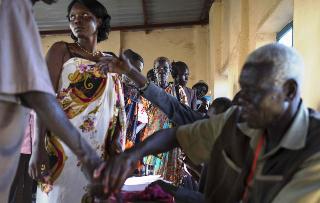Ngok Dinka to campaign for international recognition of Abyei referendum outcome
October 1, 2014 (JUBA) – The Ngok Dinka leadership in Abyei has formed a high level advocacy team to lobby international recognition of an unilateral referendum organised in October 2013 to determine the final status of the contested area.

Mijak, who leads the team, said the objective of this diplomatic campaign is to convince the international community and key influential countries and organisations to recognise the result of the referendum his community conducted in 2013.
The African Union and the UN Security Council rejected the organisation of the unilateral plebiscite and descried its outcome as illegal. The move was seen as threat to the implementation agreement the two countries reached to settle outstanding issues through the African Union High-Level Implementation Panel (AUHIP).
Juba and Khartoum governments also refused to recognise the result of the unilateral vote and renewed their commitment to reach a agreement over a referendum the disputed region should run to decide on the future of Abyei.
However, Khartoum insists on the need to form a joint administration and police force agreed June 2011 before any discussions on the vote on self-determination, but the Ngok Dinka refuse the implementation of this deal.
“The situation of our people is not good and it can never improve if the referendum result is not recognised. The people will continue to live in uncertainty,” Majak told reporters in Juba on Wednesday.
“They want the international community to stand with their decision to join the Republic of South Sudan. That is why we urge them (the international community), especially the United States of America, the African Union and the United Nations not stop to their support,” he further said.
Mijak further appreciated humanitarian assistance to civilians mainly provided by US-based aid organisations
“The Abyei protocol was a result of the role played by the government and the people of United States during the negotiation of the comprehensive peace agreement,” he said.
He also mentioned the proposal of the AUHIP to hold a referendum where the Misseriya nomads would not take part in the vote, saying the regional organisation also has to recognise the unilateral vote because it is conform to what it had preconised.
“The African union also has a role to play because it is the one which proposed the proposal to conduct the referendum in the area in October 2013. What our people did was to vote for this proposal to be implemented so that the status of the area is determined. Now we want them to recognise this result,” Mijak explained.
The status quo in the disputed area is frustrating the two communities residing Abyei due to lack of services and development. The Misseriya tribe recently lobbied Khartoum to remove it representative and co-chair of the Abyei Joint Oversight Committee (AJOC) al-Khair al-Fahim and to appoint Hassan Ali Nimr.
Also in July the leaders of the nine Ngok Dinka chiefdoms said they would lobby the South Sudanese government to formally recognise the referendum, but their efforts were unsuccessful.
The Sudanese and South Sudanese sides failed since 2005 to reach an agreement over who is resident of the disputed areas. Juba refuses the participation of the Misseriya nomads saying they stay in the fertile region only several months while Khartoum claims that this border area belongs to the pastoralists.
(ST)
